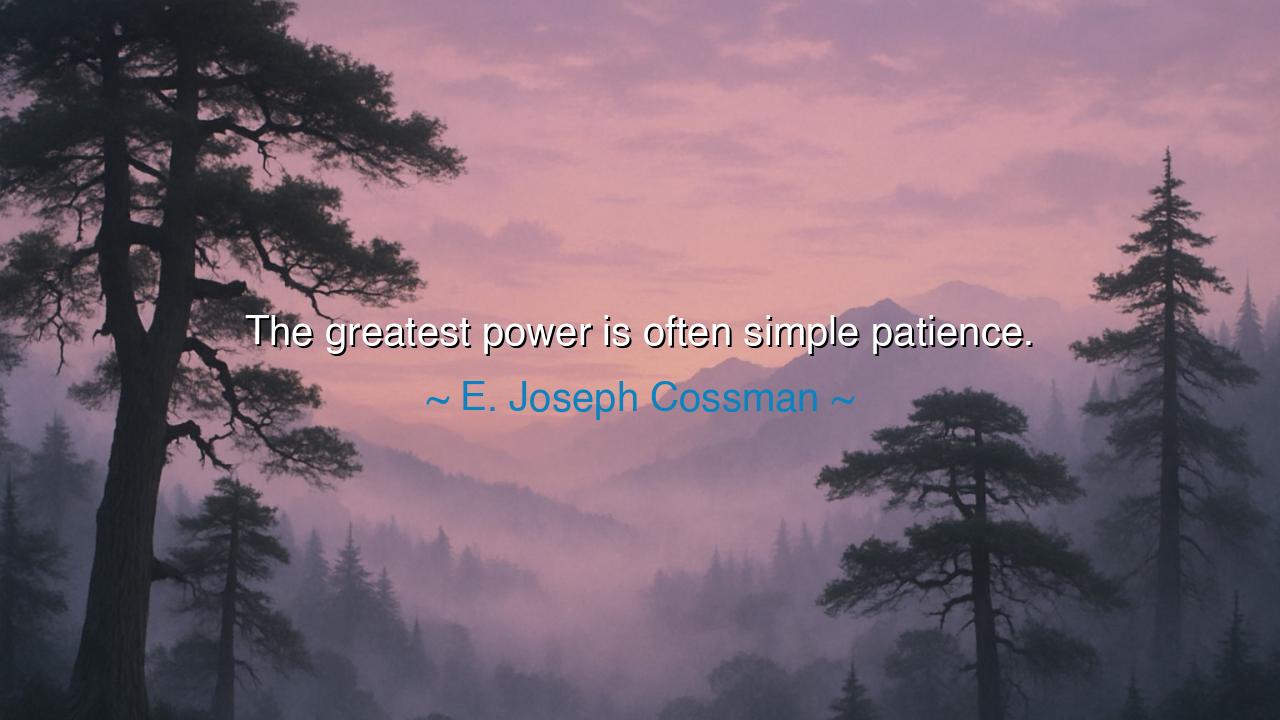
The greatest power is often simple patience.






Hear the words of E. Joseph Cossman, clear and timeless: “The greatest power is often simple patience.” In these few words lies a teaching older than empires, older than kings, older even than written wisdom itself. For though the world exalts speed, strength, and conquest, it is the quiet endurance of patience that conquers most surely. This power does not flash like lightning, nor roar like thunder, but moves like the steady river that shapes valleys, or the silent roots that hold the tallest tree upright.
Patience is not weakness, nor is it passivity. It is the mastery of self, the refusal to be ruled by haste, anger, or fear. The impatient strike too quickly, exhaust themselves, and fall. But the patient wait, endure, and gather strength. Theirs is the power of timing, of acting at the right moment, when all is ripe. Thus Cossman reminds us that the greatest power is not always found in force, but in restraint, in waiting, in the quiet strength that outlasts all storms.
Consider the tale of the Roman general Fabius Maximus, known as Cunctator, the Delayer. When Hannibal marched into Italy with fire and fury, the Romans clamored for swift battle. But Fabius held back, refusing to be drawn into traps. He shadowed Hannibal, cut off supplies, and let time wear the invader down. Though mocked for cowardice, his patience saved Rome when rash generals failed. In the end, it was his endurance, not reckless valor, that preserved the Republic. Truly, his example shows that patience can wield more power than the sword.
So too in the life of the Mahatma, Gandhi of India. Against the might of empire, he raised no army, fired no shot. Instead, he wielded patience—years of marches, fasts, imprisonments, and steadfast resistance. Many grew weary, but Gandhi’s patience was unbreakable. In time, the empire itself, vast and proud, bowed to his endurance. Thus, his power was not in violence, but in the strength of spirit to wait, to endure, to persist until victory came.
Cossman’s words remind us that in every struggle—be it in war, in art, in business, or in daily life—impatience leads to ruin, while patience brings fruit. A seed does not bear fruit in a day; it must rest in soil, watered and warmed, until the time is right. To demand harvest too soon is to destroy it. So too with dreams, with relationships, with labors of the heart: only by waiting, only by enduring, do they come to fullness.
The lesson, then, is clear: if you would wield true power, cultivate patience. When provoked, hold your peace. When tempted to rush, wait and endure. When discouraged, press on, for time itself can be your ally. The strong may win battles, but the patient win wars. The clever may dazzle for a moment, but the patient endure for generations. Patience is the power that outlasts all others.
Practical wisdom lies before you: practice patience in small things, so you may be strong in great things. Wait kindly in the face of insult. Hold steady in the midst of trial. Resist the lure of haste when decisions press upon you. Trust that time, joined with endurance, will bring forth outcomes better than any forced by rashness. In every arena, let your patience sharpen your power.
So let these words be engraved upon your heart: “The greatest power is often simple patience.” For the world will always exalt the loud, the swift, the mighty. But the wise know that the deepest strength is quiet, enduring, and steadfast. Be patient, and you shall be like the mountain unmoved by storms, like the river carving valleys, like the oak that endures through centuries. In patience, true power resides.






AAdministratorAdministrator
Welcome, honored guests. Please leave a comment, we will respond soon